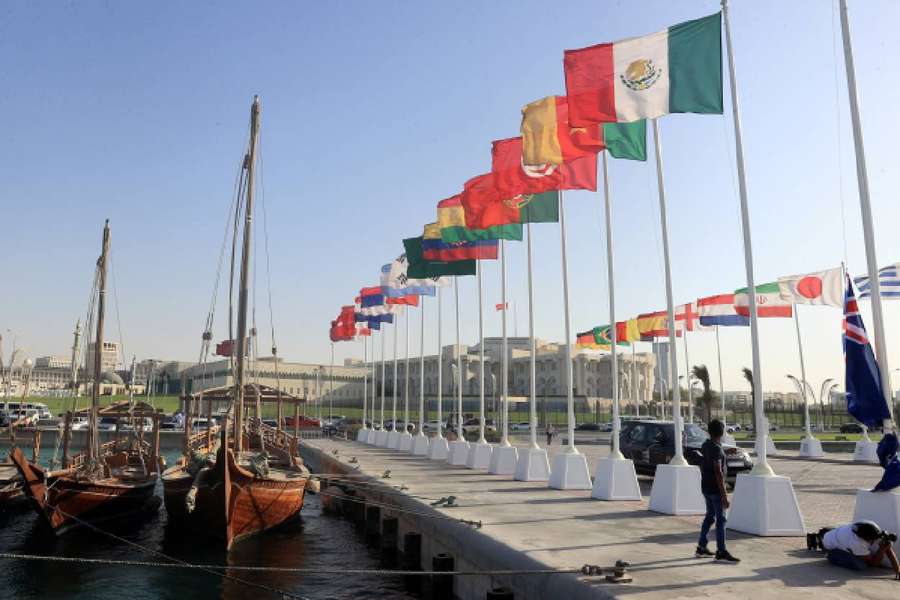But the environmental costs of transporting those visitors nearly 400 km (249 miles) for match days, overwhelmingly by plane, raises further doubts over Qatar's pledge last year to host the first-ever carbon-neutral World Cup.
While more than a million soccer fans are expected to attend the tournament, Qatar had just 30,000 hotel rooms as of March. More are due to be added before the tournament kicks off on November 20th, but many will be occupied by soccer teams, their support staff and World Cup officials.
"We expect the traffic to be pretty big and pretty busy to and from the World Cup," said Dubai Airports Chief Executive Paul Griffiths, predicting many fans will choose to stay in Dubai, where there are about five times as many hotel rooms - and easier access to alcohol.
State-owned Qatar Airways has helped organise a shuttle service operated by regional airlines in and out of Doha on match days from Gulf cities, including at least 60 daily flights to and from Dubai.
That raises questions over the organisers' initial pledge to make the event carbon neutral, a large part of which they said hinged on it being centred around the capital Doha, with fans flying into one airport and staying in one location, rather than being spread across numerous cities like previous tournaments.
A June 2021 report by the Qatari organisers and governing body FIFA, covering tournament-related activities from 2011 to 2023, said the World Cup was expected to produce 3.6 million tonnes of carbon dioxide, with travel the largest contributor, accounting for 52%, due mainly to international flights.
That was produced before the shuttle services between Qatar and other Gulf states were unveiled this year.
"The immense volume of shuttle flights from neighbouring countries further undermines the organisers' claim that having so many stadiums concentrated in a small geographical area would help reduce emissions related to air travel," said Khaled Diab, communications director at advocacy Carbon Market Watch.
"(That) will stretch the credibility of the tournament's elastic carbon-neutrality slogan to snapping point."
A spokesperson for the World Cup organizer said its shuttle service enables "efficient direct flights to and from the FIFA World Cup in Qatar", which it says are "significantly more carbon effective than flights with stopovers".
"From the beginning of our planning... we have always aimed to welcome fans from across the GCC (Gulf Cooperation Council) region," it said.
"As such, our greenhouse gas footprint included a proportion of fans travelling from the GCC region to attend matches. The estimation was based on number of travellers, distance and mode of transport."
"After the tournament, we will update the carbon footprint based on actual data."
EASING THE SQUEEZE
To ease the hotel squeeze, Qatar is building temporary accommodation on the outskirts of Doha, while cruise ships will anchor off the coast offering accommodation to World Cup fans.
But hotels in Dubai, the Gulf's most popular tourism destination, are already reporting strong bookings in the fourth quarter, particularly during the four-week soccer tournament.
"We're seeing a lot of demand for the World Cup," said Paul Bridger, chief operating officer of Rove Hotels, a locally owned hotel brand operating nine mid-tier hotels across Dubai.
Bridger said bookings in the fourth quarter, which overlaps with Dubai's peak October to February winter tourism season, were four times that of 2019, the year before the pandemic.
In a bid to attract soccer fans, Qatar's neighbours including the United Arab Emirates - of which Dubai is a part - and Saudi Arabia will offer entry visas to World Cup ticketholders.
Monther Darwish, managing director of Dubai's five-star luxury Palazzo Versace, said he expected the 215-room hotel to be fully booked from October to December, with many guests to shuttle between Dubai and Doha throughout the World Cup.
The managing director of private jet operator DC Aviation Al-Futtaim, Holger Ostheimer, said enquiries for chartered flights from Dubai to Doha had increased three to fourfold.
Climate advocates had already raised doubts about the tournament being carbon neutral, although the organisers have announced a string of initiatives to reach that goal.
These include solar-powered stadium air conditioning, using shipping containers as building materials, and purchasing credits to offset emissions, a measure organisers have said should be recognised, not criticised.
But Greenpeace Programme Director, Julien Jreissati, said the tournament was not going to be carbon neutral even before shuttle flights were organised. "The problem with offsetting is, basically, it doesn't work," he said.




